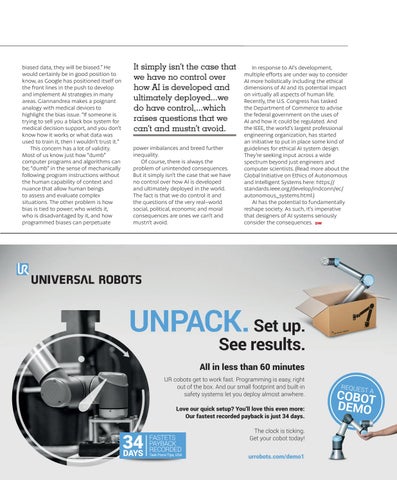biased data, they will be biased.” He would certainly be in good position to know, as Google has positioned itself on the front lines in the push to develop and implement AI strategies in many areas. Giannandrea makes a poignant analogy with medical devices to highlight the bias issue. “If someone is trying to sell you a black box system for medical decision support, and you don’t know how it works or what data was used to train it, then I wouldn’t trust it.” This concern has a lot of validity. Most of us know just how “dumb” computer programs and algorithms can be; “dumb” in the sense of mechanically following program instructions without the human capability of context and nuance that allow human beings to assess and evaluate complex situations. The other problem is how bias is tied to power; who wields it, who is disadvantaged by it, and how programmed biases can perpetuate
It simply isn’t the case that we have no control over how AI is developed and ultimately deployed...we do have control,...which raises questions that we can’t and mustn’t avoid. power imbalances and breed further inequality. Of course, there is always the problem of unintended consequences. But it simply isn’t the case that we have no control over how AI is developed and ultimately deployed in the world. The fact is that we do control it and the questions of the very real-world social, political, economic and moral consequences are ones we can’t and mustn’t avoid.
In response to AI’s development, multiple efforts are under way to consider AI more holistically including the ethical dimensions of AI and its potential impact on virtually all aspects of human life. Recently, the U.S. Congress has tasked the Department of Commerce to advise the federal government on the uses of AI and how it could be regulated. And the IEEE, the world’s largest professional engineering organization, has started an initiative to put in place some kind of guidelines for ethical AI system design. They’re seeking input across a wide spectrum beyond just engineers and computer scientists. (Read more about the Global Initiative on Ethics of Autonomous and Intelligent Systems here: https:// standards.ieee.org/develop/indconn/ec/ autonomous_systems.html.) AI has the potential to fundamentally reshape society. As such, it’s imperative that designers of AI systems seriously consider the consequences. DW
UR_USA_Ad_Ready_To_Go.indd 1 Artificial Intelligence_Miles 2-18_Vs3.LL.indd 57
12/01/2018 15.01 2/7/18 11:40 AM
